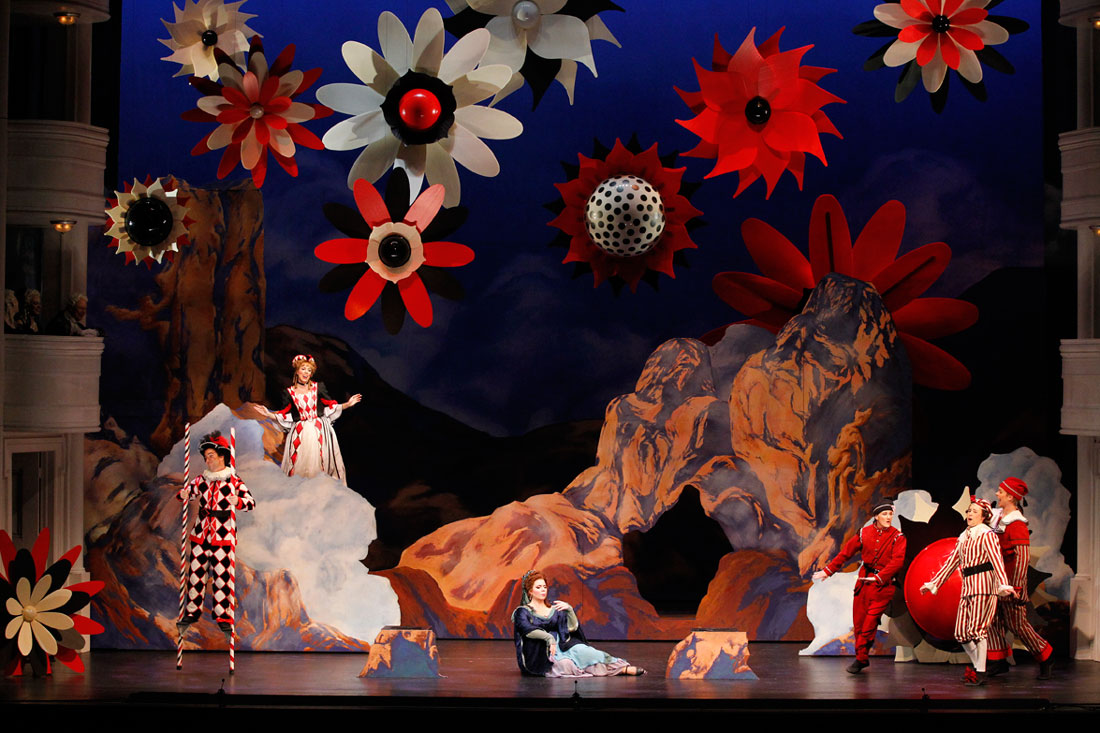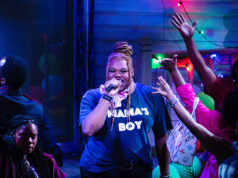Operas by Richard Strauss aren’t staged that often, not because they’re unpopular but because they’re expensive: enormous casts, huge orchestras, lavish scenery and costumes, and some of the most treacherous vocal writing in the business, requiring extra rehearsal time to pull together.
But Fort Worth Opera met the challenge and for the first time in the company’s 67-year history put on a dazzling production of Ariadne auf Naxos. After performing the opera last weekend at Bass Performance Hall, the company came away with feathers intact and a performance close to a triumph.
The sets, originally designed by Robin Vest for Utah Opera, were marvelous. The first act featured a luxurious, white 18th-century room with an avenue of glass French doors topped by glass fan windows upstage. A charming miniature courtyard in the same palace arranged with painted boulders to suggest the entrance to a cave set the scene for the second act.
The plot is tricky, involving two traveling troupes engaged by a count to entertain his dinner guests. One is a circus act, the other a serious opera company prepared to present the finale of a new setting of the Greek myth of Ariadne, the goddess who fell in love with the god Theseus, king of Athens. After helping him slay the Minotaur, she is abandoned by Theseus on a desert island. This is where the little troupe intends to pick up her story, with Ariadne endlessly lamenting her fate before finally being rescued by Bacchus, who offers her the true love that she seeks.
When the curtain rises, the two bands of performers are sharing the same waiting area, bickering back and forth about having to put up with each other. Word comes down that the entertainment time has been cut to only two hours. If the performers want to get paid, they’re going to have to merge their efforts.
And they’ve got only 10 minutes to do so.
The resulting pandemonium is uproarious. But once the dust settles and the story gets moving, the characters begin to become real, giving the singers ample opportunity to shine.
For ardent young male roles, Strauss avoided using tenors, reverting instead to the old practice of substituting women mezzo-sopranos. As the romantic and noble Composer, mezzo Cecelia Hall poured out her heart. In one of the great moments in the production, she raged against the vandalization of Composer’s beautiful music by lowbrow comedians, her voice rising in higher and more ravishing waves with the orchestra surging in support.
Sung by soprano Marjorie Owens, Ariadne had her moment, in the second act, lamenting Theseus’ betrayal and grieving over lost love in a stirring aria sung with nobility and grief. Last seen two years ago as Leonora in Il Trovatore, Owens can lift her voice easily over a swelling orchestra, but when she opened up here, she lost focus and her voice tended to spread, something I don’t recall hearing from her before.
As Bacchus, tenor Corey Bix showed the same inclination at the top of his range and also was a bit stiff. Maybe it was a case of nerves, but he never did seem to warm to the role. His was the least persuasive performance of the evening.
As Zerbinetta, leader of the circus group, young Audrey Luna delivered the night’s showstopper, a coloratura free-for-all directed at Ariadne, who spent much of the time lying on the ground sobbing. In the aria that begins with “Great high and mighty princess,” an effort to revive the goddess’ spirits, Luna used every vocal trick in the book, sailing into the stratosphere with runs, skips, trills, a note that sounded like a high F, you name it. The audience erupted in a roar when she finished and kept it up for some time. In another age she would have come to the footlights to take a bow, but that went out of fashion 50 years ago, so she just sat still and drank in the ovation.
There are 17 spoken or sung roles in Ariadne, and they were all done handsomely. Jeni Houser, Amanda Robie, and Corrie Donovan delightfully sang Ariadne’s three attending nymphs, and Steven Eddy, Zac Engle, Anthony Reed, and Michael Porter were outstanding singing the four circus clowns.
Stage director David Gately kept the show flowing breezily and can list this production as one of his great successes, on a par with the memorable Cinderella that he staged here three years ago.
Joe Illick conducted the Fort Worth Symphony with a zest for Strauss’ epic orchestrations and sensitive support for the singers. The French horn in particular stood out during brief solos.
If you love opera –– heck, just if you love music –– this production of Ariadne auf Naxos should not be missed. l
[box_info]
Fort Worth Opera Festival
Ariadne auf Naxos
2pm Sun at Bass Performance Hall, 525 Commerce St, FW. $75-195. 817-731-0833.
[/box_info]












